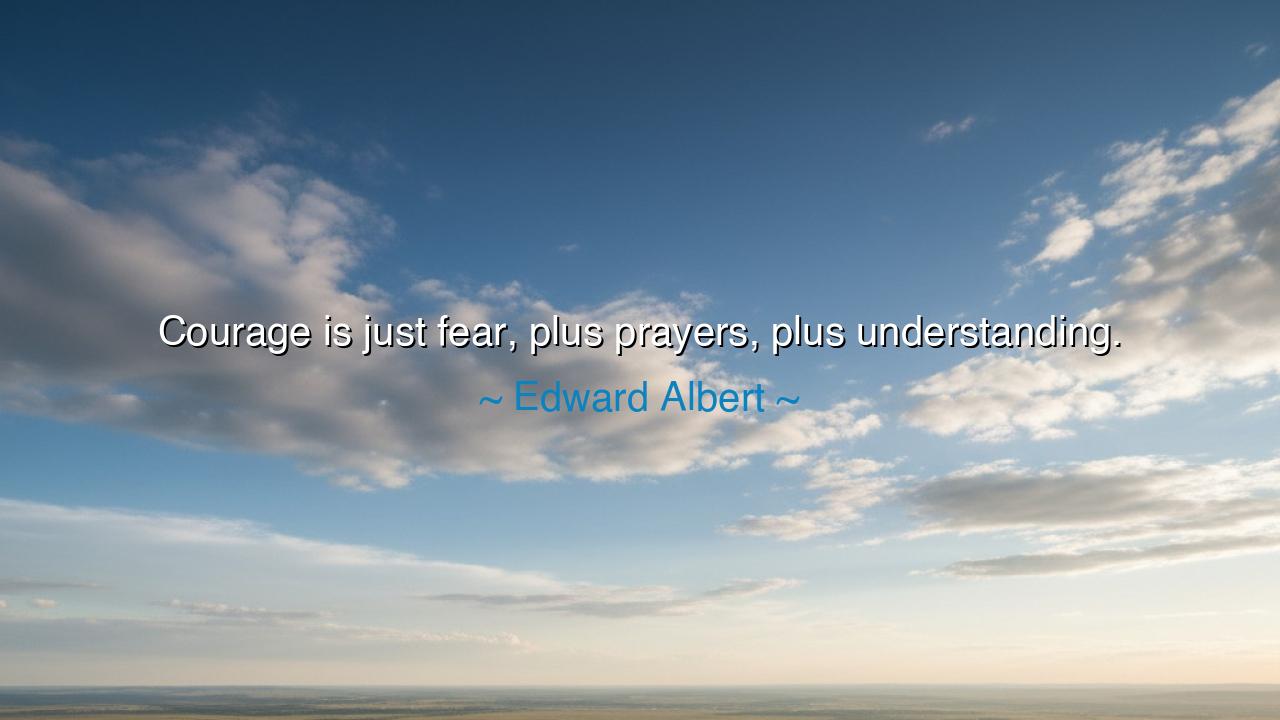
Courage is just fear, plus prayers, plus understanding.






“Courage is just fear, plus prayers, plus understanding.”
Thus spoke Edward Albert, actor and humanitarian, whose life reflected both the struggle and grace found in the heart of the human journey. In this profound and humble statement, he unravels one of the oldest mysteries known to mankind — the nature of courage. So often do people believe that courage means the absence of fear, that only the fearless can be brave. Yet Albert, with wisdom shaped by experience, teaches us a truer path: that courage is not the absence of fear, but the mastery of it — fear transformed by faith and guided by wisdom.
The origin of these words lies not in philosophy alone, but in the lived reality of the human spirit. Edward Albert, who dedicated his life to advocacy for the environment and for indigenous peoples, knew that great causes demand not perfection, but perseverance. He witnessed suffering, faced illness, and stood firm in the face of adversity, discovering that every act of bravery begins in fear — the trembling of the heart before the unknown. But fear, when met with prayer and understanding, becomes a sacred fire: it does not consume, but refines. Thus, in his words, we find a formula for true courage — one born not of arrogance or recklessness, but of humility, faith, and insight.
Let us look deeply at each part of his teaching. The first element is fear — the raw, primal emotion that lives in all hearts. Fear is not a flaw, but a gift, for it warns us of danger and reminds us of our frailty. Yet left alone, it enslaves the mind. Fear must be met, not denied. The second element, prayer, is the act of reaching beyond oneself — whether to God, to love, or to the higher truth within. Prayer sanctifies fear; it turns panic into purpose, chaos into calm. And finally comes understanding, the wisdom born of reflection — the ability to see beyond the terror of the moment and grasp its meaning. When fear is joined with prayer and understanding, it becomes courage: the strength to act rightly, even when the heart trembles.
This sacred formula has revealed itself across the pages of history. Consider the story of Harriet Tubman, the fearless conductor of the Underground Railroad. Every journey she led was steeped in danger — capture, death, betrayal. Yet she confessed that she was often afraid. What gave her strength? Faith and understanding. Each time fear rose within her, she prayed — and through prayer, she found clarity. She understood that her fear was not a sign to turn back, but a reminder of what was at stake: the freedom of her people. Thus, her fear, joined with prayer and understanding, became an unshakable courage that freed hundreds from the bonds of slavery.
Albert’s words echo the timeless truth that true courage is not born in the battlefield, but in the heart. The soldier who charges into battle, the mother who defends her child, the teacher who speaks truth in the face of oppression — all tremble, all doubt. Yet they rise above fear through the alchemy of spirit. Courage is forged in that quiet moment when one whispers a prayer, takes a breath, and chooses to act despite the trembling. This is why Albert’s definition is so powerful: it reclaims courage from the unreachable pedestal of the fearless and gives it back to all of us — the ordinary souls who face extraordinary trials.
In this way, fear becomes the beginning of faith, not its enemy. To pray amidst fear is to admit one’s vulnerability and open the heart to strength beyond self. To seek understanding in the face of fear is to rise above it, seeing that pain, danger, and loss are not the whole of life. Those who combine these three — fear, prayer, and understanding — find that courage is not a single moment of triumph, but a way of living. It is the calm in the storm, the quiet persistence through suffering, the grace to stand when one might fall.
So, my child, take this teaching and let it dwell within you. When fear comes — as it surely will — do not curse it or run from it. Acknowledge it as a visitor, a teacher. Then pray, in whatever form prayer takes for you — a whispered plea, a moment of stillness, a call to the divine within. And when peace touches your spirit, seek understanding: ask what this fear reveals, what lesson it brings, what truth it demands. Then act, not in panic, but in purpose. That act — trembling yet faithful, uncertain yet wise — is courage.
And remember this always: even the bravest among us are afraid. The hero feels fear just as the coward does — but the hero adds prayer, and the hero adds understanding. The coward lets fear command him; the courageous let it transform them. Thus, courage is not the roar of power, but the quiet strength of the soul that chooses to face the darkness with a steady heart. For when fear, prayer, and understanding unite, they give birth to something divine — the light that leads humanity forward through every shadow, across every age.






AAdministratorAdministrator
Welcome, honored guests. Please leave a comment, we will respond soon